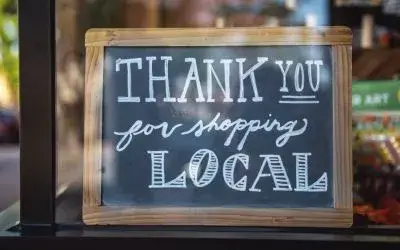Are You Heading Out For Some Holiday Shopping? Budget Wisely, Saint Leo College Of Business Faculty Advise
Black Friday may not be the best, but there still are deals, and don’t forget to “spend with meaning,” our faculty note.

Black Friday may not be the best, but there still are deals, and don’t forget to “spend with meaning,” our faculty note.

Whether it’s something to go under a Christmas tree or in a holiday stocking, a gift for one of the eight nights of Hanukkah, or an item purchased to treat yourself, thoughts turn to shopping and holiday spending at this time of year.
The National Retail Federation is forecasting that holiday spending will reach record levels during November and December and will grow between 3% and 4% over spending in 2022 to between $957.3 billion and $966.6 billion.
In the past, “Black Friday,” the Friday after Thanksgiving, traditionally marked the beginning of the Christmas shopping season in the United States. Stores would offer discounted prices and open early — some even on Thanksgiving Day — in order to woo customers.
“What we have seen this year is an earlier start to the Black Friday deals,” said Dr. Keith Jones, associate professor of marketing in Saint Leo’s Tapia College of Business. “The label ‘Black Friday’ no longer stands for a single day, but is a relabeling for ‘Holiday Deals’ being offered during the fall.”

With the current financial situation in the United States, many people are purchasing earlier than before and to capitalize on that, the retailers are offering Black Friday deals prior to Thanksgiving, Jones said. “In fact, some have been promoting ‘Black Friday’ deals in October and November.”
Shopping habits have changed, too, noted Dr. Patrick Ryan Murphy, professor of economics at Saint Leo. “I think with the growth of Amazon and its Prime Days, the game has changed over the last few years,” Murphy said.

“I do recall waking up or camping out for crazy deals at stores like Best Buy, JCPenney, or Walmart, but I think there was quite a big pushback by consumers — and workers — looking for more time with their family,” he added.
Most stores that previously were open on Thanksgiving Day have reverted to a more family-friendly model of remaining closed on the holiday so that employees and shoppers can enjoy the day with family and friends.
Spending Trends
Those celebrating the winter holidays plan to spend $875 on average on gifts, decorations, food, and other key seasonal items, according to the National Retail Federation’s latest consumer survey conducted by Prosper Insights & Analytics, a press release stated. And the bulk of that amount, $620, will be spent on gifts, the survey shows. But is it wise?
“The expectations are mixed,” Jones said. “Some experts are reporting that people are saying they are going to spend less and spend less per person in addition to shortening the shopping list this year. The main reason given is the current economic environment.”
Murphy said budgeting for holiday spending really is family- and household-specific. “I would always suggest making sure people spend and save responsibly, but the holidays can be a time of increased pressure to spend more than usual,” the economics professors said. “With inflation rates still higher than they were in much of the 2010s, it makes it tougher to stretch paychecks further.”
Holiday budgeting is always a challenge, agreed Jones, the marketing faculty member. “ʻBack in the day,’ banks used to offer the Christmas Club [savings] programs, but today, not so much.
“One of the main pieces of advice would be to avoid using the credit card if at all possible,” Jones continued. “[Because of] The uncertainty of future interest rate hikes, the deal you got on Black Friday may end up costing you much more when one considers the addition of interest on the unpaid balances.”
Deals May Be Out There
While there will be deals on Black Friday, those may be limited. Yes, there will still be deals on Black Friday, the day after Thanksgiving. Jones suggests the best approach to holiday shopping this year is to “create the list of gifts you are wanting to purchase. Followed by setting the price range in which you believe is a 'good deal.' Then, start monitoring. When your item enters that range, purchase.”
While consumers might run the risk of paying a little more, they will have secured the gift. “To capture the purchase, many companies are doing their best deals now and won't be offering them again,” Jones added.
While the National Retail Federation reported that more shoppers returned to brick-and-mortar stores in 2022, many studies indicate there is going to be an increase in online purchasing this year. “There are several factors driving those practices,” Jones said. “Free shipping to the recipient, product availability, ease of purchasing including not fighting traffic or crowds, and the process is faster and saves time. The consumer does not want to get to the store and then not be able to purchase because the product is out of stock.”
Supporting Local Businesses
While the Friday after Thanksgiving is known as Black Friday, Saturday, November 25, 2023, will be observed as Small Business Saturday, a day to celebrate and support small businesses and all they do for their communities, according to the U.S. Small Business Administration (SBA).
Small Business Saturday was founded by American Express in 2010 and has been co-sponsored by SBA since 2011. It has become an important part of small businesses’ holiday season with restaurants and small retailers trying to capture a share of the market.

A 2022 survey, sponsored by American Express, showed that 72% of U.S. consumers polled agree they will “Shop Small” throughout the holiday season because of the impact it makes on their local community.
Murphy, the economics professor, said that shopping local really is a decision for each household to make. “Personally, I think it is great to support the local businesses when possible, but I can’t fault people for looking for the best deal possible, even if that means shopping online,” he said.
Jones suggests it might be time for something else. “This may be the year to practice the ‘old-fashioned Christmas’ and look more into what you can make and share with others rather than purchasing expensive products that may not be used or may be returned.”
Shoppers may also want to check out the local retailer rather than the big chain stores.
“If you are not spending as much, then spending with meaning becomes even more important,” Jones added. “The local retailer may offer that 'something special' that other mainstream retailers cannot offer.”